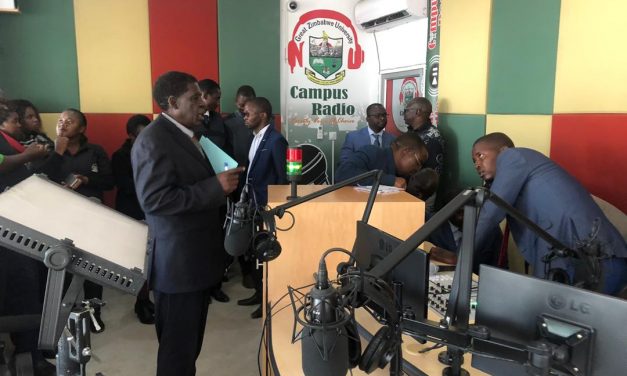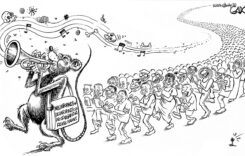Great Zimbabwe University students and staff with ZBC officials in the campus studio. Photo – ZBC
In the midst of all-out information warfare, schools and universities have been identified as strategic frontiers in the fight against the spread of false information.
Media literacy programmes in schools and tertiary institutions have become an important factor in this push-back.
In Zimbabwe, ZimFact, the country’s first organised fact-checking initiative, is partnering universities on its media literacy programme.
Apart from equipping students to evaluate the information they get, the media literacy programme also seeks to train potential fact-checkers for what is still a new but growing sub-sector of the media industry.
The Great Zimbabwe University (GZU), one of the institutions which ZimFact is partnering in the media literacy programme, has recently set up a campus radio station, which will not only help in journalism training, but also aid in delivering good quality information to its 16,000-strong student community. The radio station could also potentially serve the university’s 1,500 academic and non-academic staff.
Here, Golden Maunganidze of the Great Zimbabwe University spotlights his institution:
Great Zimbabwe University (GZU) has become the first journalism training institution to come up with a campus broadcast radio studio.
The studio, which was officially commissioned earlier this year, is made up of an audio mixer, four microphones to facilitate participation by guests who are featured on various programmes, a phone – in facility, latest production monitoring and control devices as well as computerised play-out systems.
GZU was founded in 2002 as Masvingo State University through an Act of Parliament. It was later renamed Great Zimbabwe University in 2007.
The university has, since inception, produced about 600 journalism and media graduates.
Currently, the university has over 400 students in the journalism and media training department.
The overall enrolment is 16,000, with the majority at its main Masvingo campus and the rest spread across satellite campuses in Chivi, Mashava and Chiredzi.
GZU Vice Chancellor, Rungano Zvobgo, hopes the radio station will provide a channel for inter-campus communication.
Currently, the programming for students covers all programming formats such as magazine, features, talk-shows, current affairs and news.
The university has signed up an agreement with the Zimbabwe Broadcasting Corporation (ZBC), which allows its students to produce content for the national broadcaster, while receiving hands-on training.
The radio station has already done a number of pre-recorded and live productions for both ZBC TV and radio stations.
The university hopes to have the station licensed as a community radio station, which will offer broadcast services on local issues to communities around Masvingo.
Golden Maunganidze is the director of the Great Zimbabwe University (GZU) Campus Radio, a lecturer, holds a Masters degree in Media Studies and is currently pursuing PhD studies with Tilburg University, Netherlands.
Do you want to use our content? Click Here












